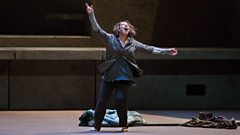
Strauss's Elektra
Live from the Metropolitan Opera, New York, Strauss's version of the Greek myth of Elektra, conducted by Esa-Pekka Salonen. Starrring soprano Nina Stemme.
Today's Live from the Met is Strauss's mighty take on the Greek myth Elektra. Daughter of King Agamemnon and Queen Klyt├Ąmnestra, Elektra is in mourning for her father, killed by her mother and her lover. Elektra is obsessed with the revenge she intends to take, enlisting her siblings for help. In this startlingly modern sounding work, Nina Stemme sings Elektra, driven mad by her desire for revenge, Waltraud Meier her fearsome mother, and Eric Owens and Adrianne Pieczonka her brother and sister.
Presented by Mary Jo Heath and Ira Siff.
Strauss: Elektra
Elektra ..... Nina Stemme (soprano)
Chrysothemis ..... Adrianne Pieczonka (soprano)
Aegisth ..... Burkhard Ulrich (tenor)
Klyt├Ąmnestra ..... Waltraud Meier (mezzo-soprano)
Orest ..... Eric Owens (bass-baritone)
Orest's guardian ..... Kevin Short (bass-baritone)
A young servant ..... Mark Schowalter (tenor)
An old servant ..... James Courtney (bass)
Overseer of the servants/Klyt├Ąmnestra's confidante ..... Susan Neves (soprano)
First maid ..... Bonita Hyman (contralto)
Second maid ..... Maya Lahyani (soprano)
Third maid/Klyt├Ąmnestra's trainbearer ..... Andrea Hill (soprano)
Fourth maid ..... Claudia Waite (soprano)
Fifth maid ..... Roberta Alexander (soprano)
The Chorus of the Metropolitan Opera House, New York
The Orchestra of the Metropolitan Opera House, New York
Esa-Pekka Salonen (conductor).
Last on
More episodes
Previous
Music Played
-
![]()
Wolfgang Amadeus Mozart
Sonata for piano duet (K.497) in F major [complete]
Performer: Christoph Eschenbach. Performer: Justus Frantz.- Mozart: Music for Piano Duet: Justus Frantz, Christoph Eschenbach.
- Deutsche Grammophon.
- 1.
Synopsis
In the courtyard of the Palace of Mycenae, the servants are wondering whether Elektra will be grieving over her father, as is her daily ritual. Daughter of King Agamemnon and Klyt├Ąmnestra, Elektra appears and locks herself up in her solitude straight away. The servants all criticize and mock her, except for one, who takes her defense.
By herself, Elektra remembers how Agamemnon was assassinated upon his return from Troy, slain with an axe by Klyt├Ąmnestra and her lover, Aegisth. Devastated with grief, Elektra is obsessed with the revenge she intends to take together with her sister, Chrysothemis, and her brother, Orest. The latter grew up far away from the palace and Elektra is keenly waiting for him day after day.
Chrysothemis interrupts Elektra, who is caught up in her thoughts, and warns her that Klyt├Ąmnestra and Aegisth have decided to lock her up in a tower. Chrysothemis asks her sister to renounce vengeance and let life take over again. Elektra rejects the idea with disdain.
Klyt├Ąmnestra arrives with her entourage. She has been preparing sacrifices hoping to pacify the gods as she suffers from nightmares. She wants to talk to Elektra, and when her daughterÔÇÖs words are more amenable than usual, she sends off her followers to stay with her. The mother asks her daughter what remedy could restore her sleep, and Elektra reveals that a sacrifice may indeed free her from her nightmares. But when the queen, full of hope, asks who needs to be killed, Elektra replies that it is Klyt├Ąmnestra herself who has to die. Elektra goes on to describe with frenzied elation how her mother will succumb under OrestÔÇÖs blows. Then the court is thrown into a panic: two strangers have arrived and ask to be seen. A few words are whispered to the queen, who immediately leaves without saying a single word to Elektra.
Chrysosthemis is the one who comes to bear the terrible news: Orest had died. At first Elektra remains deaf to what has been said. Then, having lost all hope, she concludes that she herself and her sister need to act without further delay. But Chrysothemis refuses to commit such a deed and flees. Elektra curses her, realizing that she will have to act alone.
One of the strangers, who claims to be a friend of Orest and has come to bear the news of his death, has now been at the court for a while. Elektra besieges him with questions. When she reveals her name, he is shaken. She doesnÔÇÖt recognize him until the servants of the palace throw themselves at his feet: It is Orest who stands before of her, Orest who tricked everybody into believing he was dead in order to sneak into the palace. Elektra is both elated and in despairÔÇöshe feels immeasurable fondness for her brother and deep sadness about the life of a recluse she has chosen for herself. The two are interrupted by OrestÔÇÖs tutor: the hour of vengeance has arrived and the deed Orest has come to perform now needs to be done. Orest enters the palace. Elektra listens for the slightest noise. Klyt├Ąmnestra is heard screaming. ÔÇťHit one more time,ÔÇŁ Elektra cries out. The queen draws her last breath.
There is a moment of panic when the servants hear cries. But they flee when they are told that Aegisth is returning from the fields. As the sun is setting, he encounters Elektra, who in a sudden joyful mood offers to light his way into the house. Soon enough it is his turn to scream for help. He too succumbs to vengeful hands.
Chrysothemis comes out of the palace and tells her sister about their brotherÔÇÖs return and the double murder of Klyt├Ąmnestra and Aegisth. Elektra, hovering between ecstasy and madness, maintains that only silence and dance can celebrate their liberation. Beset by extreme frenzy, she dances until she drops: she will never be the one to have executed the act of revenge. As for Orestes, he leaves the palace, alone and in silence.
- With thanks to the Metropolitan Opera, New York
Broadcast
- Sat 30 Apr 2016 18:00┬ÚÂ╣ď╝┼─ Radio 3


